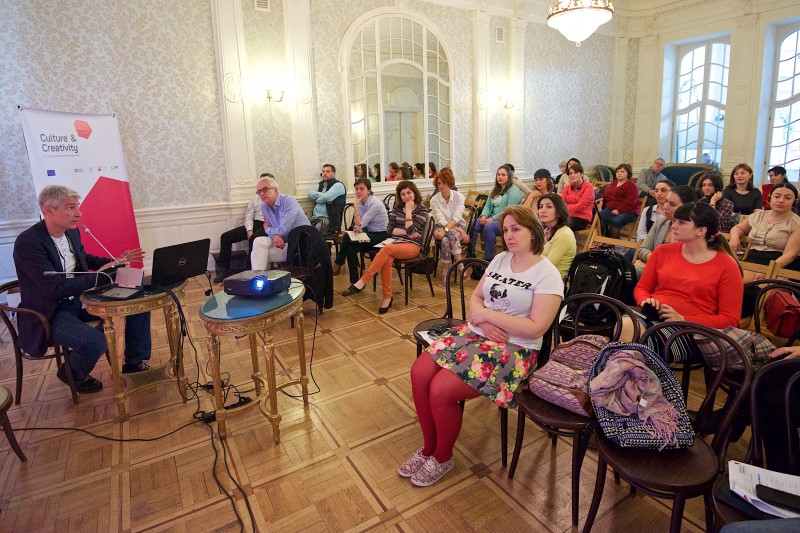
Yaroslav Petrakov: "British Universities Have Evolved Along With Its Community. We Have To Do The Same"
What tasks for business could universities solve?
First of all universities form proposals for the labour market. By teaching their students, they grow specialists who later come to the labour market and due to their competences, skills and knowledge are generating added value. That means that universities are an integral part of the ecosystem widening capacities of the labour market and business to a more productive, efficient and effective operation.
For the society, universities are a social elevator. They provide opportunities for the youth to get a good job and get up the social ladder higher than those without education.
Universities also play an important role for communities they belong to, as they are an element of closed circuit of innovative product creation. We cannot create innovations without research, tests and laboratories – it's not that often that you will find all this on the business level. This is the part of social product creation that should be, at least partially, financed by the state.

How would you characterise the state of affairs in Ukraine?
Presently we have good universities; there are examples of successful business, strong communities and so many creative people... But they are all disconnected, there is no ecosystem connecting them all to talk about. British universities on the other hand, focus on solving the issues their communities face, of the communities they belong to and whose centre they quite often become. For instance, Coventry has its mayor's office squeezed between the university campus buildings, and the university is constantly growing and evolving. I wish you could see those innovative campuses made of ecological materials! It is an exceptional pleasure just being there. If you compare it with Ukrainian universities with their concrete walls, poorly lit halls, lack of air conditioning in hot weather and normal heating in winter, then the picture is not that exciting... It is not every Ukrainian university that uses multimedia boards, whereas British universities use their own mobile applications.
How do British universities cooperate with business?
Out of what I have seen when visiting British universities, the most illustrative is Cambridge: population of 125000 people, 11500 instructors, 24000 students, with 96 Nobel-winning graduates. Moreover, large volume of GDP is being created there only due to that cluster of business ecosystem and understanding the needs of local community as well as of the global environment. It is a good illustration of how "Think global – act local" works.
Needless to say that Cambridge is a legendary project with centuries-old history. When it comes to short-term projects that have also caused a wow-effect on me, there is an extremely interesting case of Loughborough University. It is a small, rather young (60 years old only) university that is in the lead of the Student Experience Survey in Britain that was created by Times Higher Education. This institution specializes in training of future businessmen and strives to develop an entrepreneurial way of thinking, communication culture and life in its students; to create an environment that shall enable the fourth year students to implement their first startup project. This university is a lab to launch a micro-business, and get this! - - it attracts additional support from business accelerators and venture funds.
We have talked to the students who have received university grants for their startups this year. It is noteworthy that it is not mandatory to devise something innovative or incredible to have a successful business. One of the winning students manufactures and sells women's purses online. One might wonder that this niche was occupied and overcrowded long ago. Nevertheless, this student found a way to make her product unique: all of the purses are manufactured by only one Italian master who manually processes leather in a special way, and all prints and patterns for the purses are hand-made also. Creativity element not only makes it possible to enter a crowded market, but also increases its added value. This is exactly what Ukrainian micro-business is lacking - use of creativity in product manufacture, organization of entrepreneurial activity, marketing strategy...And this is exactly what I mean when I speak of the lack of ecosystem in Ukraine.
It is worth particularly noting Norwich university. Major focus there is not on commercialization, but on elaboration of a new education system for students and training them for real life. During the years of study a person has numerous trainings that help to catch up with those skills that are insufficient, and gets a balanced CV and a skill set that fit the market.
The university has developed a special mobile app that enables a student to assess his/her starting potential, identify weaknesses or shortcomings in skills, and then step by step improve the competencies he/she is interested in by doing exercises or studying real cases. That lasts for four years and upon completion a student becomes the best version of himself/herself in a selected field as he/she fully complies with the business needs as a personality and as a specialist. And this is still something that we are dreaming of in Ukraine.

How do they create those cases and exercises for students?
It is one more aspect that we should strive for - transparency of business. British business is very interested in saving instead of spending funds for retraining of its future staff, which is why it addresses the universities directly and explains its needs. It is a form of "mutual and beneficial cooperation". Business defines what specialists it needs as well as their respective competencies, and then provides tools and mentorship. It is virtually a mainstream attributable to all British universities, regardless of the city, its scale or status. A mentor is an instructor from business who is attached to a student for a term from 1 to 5 years and provides him/her advice regarding all issues related to professional and personal development. It is an individual who has become firmly established as a specialist and helps a student to acquire a taste of success, see the horizons and the way he/she will have to power through to achieve his/her goal. It is a very convenient form of communication that makes it possible to understand the context and needs of business a future graduate is about to join. In other words - it is a customer-focused approach by the university as well as by the students as first and foremost they are trained to think of the customer's needs right then and there.
Who becomes mentors for students most typically?
People who once were students of this university that made it possible for them to achieve success in their profession. They are ready to share their knowledge and experience with the following generation. Due to the fact that the university implants proper values in its students, it can count on the support of its graduates in the future. It once more illustrates how a university goes beyond the scope of just a university.
What Ukrainian universities should do to get underway and change the current state of affairs?
When I had a conversation with the Loughborough university startup centre's lead Kathryn Walsh, she gave an unbeatable advice as to how the educational system in Ukraine could be changed: "Just do not be afraid and start doing something. Even if you won't succeed in something - you will learn from that experience and will move on. And if you will - then it is even better, you will learn more and will move on. You have to continuously move forward".
We often think that all problems of our universities are because of lack of financing. But the problem is really in a disconnect between the universities and their community, their way of thinking. First question we heard in British universities was: "What problem can we help you to solve?" It demonstrates the entrepreneurial and customer-focused approach in the operation of the university. In addition, British higher educational institutions are very flexible - they are ready to adapt for partners, search for solutions, change, share their experience. In contrast, Ukrainian universities are very conservative and walled-off. They are expecting ready-made solutions of their problems, but even when available, they are not always ready to accept them.

We also have businesses ready to cooperate with universities, we also have graduates who are ready to become mentors for future generations, but the universities do not keep in touch with them. We need to change the universities' way of thinking: the last thing we want is to sit and wait for someone to give us some money. Educational institutions have to create value that can be monetized afterwards. If there is no value for the customer - there is no money. Ukrainian universities have to learn how to effectively utilize money that come as tuition, as well as time that students spend within their walls. Upon completion of studies students have to enter the labour market with required knowledge, skills and professional experience.
Creative Spark programme is an attempt to start changes in small steps?
By all means. Major value of this programme is in being able to see how education system works in Britain, to get familiarized with ready-made solutions. British people are very open, they have nothing to hide, they are not afraid of competition. It shall be a powerful shift for Ukraine - transparency and accessibility can demonstrate our strengths.
The programme provides for partnership and cooperation of British universities with Ukrainian unions (consortia): they can be universities, public organizations, representatives of local authorities or micro-business interested in getting familiarized with the experience of a certain British university.
How do the British see Ukraine in the Creative Spark context? Are we also deemed as their customers?
I think that we are partners for them, however, taking into account the British win-win strategy of mutual benefit we also have to offer them something. We have to find our very own thing that we can interest the British with in order to make Creative Spark a partnership programme indeed.
What in your opinion can become such a thing?
Our creative approach to everything. Ukrainians are actually very creative people. British people are genuinely happy when they manage to invent something new. On the other hand, we do it every day, but we do not value our individuality because we do not see added value in it and do not know how to get profit out of it. It is possible that this is exactly what we could interest British partners with, but of course if we would overcome the language barrier.

Is there any available algorithm of consortia creation in Ukraine to participate in Creative Spark?
It is not only consortia that can participate, but also individual universities or organizations. Consortia are just a desired option as they shall make it possible to create an ecosystem at the municipal level. There is no established algorithm for creation of such consortia; it should be the initiative of its members. It is important to understand that a consortium with business, community, volunteers has a much more significant value for the programme than just a university. British universities have evolved together with their community, their ecosystem. We need to do the same in Ukraine now. The British are interested in cooperation with us because our region is a huge market. Their business circles consider partnership of universities as a bridge to look for partners in Ukrainian business in the field of innovations.
In the light of all you have seen and heard during this business trip, what is your personal plan of action?
I want to apply utmost efforts in raising awareness about the window of opportunities provided by Creative Spark in order to see some shift not in Kyiv only, but in the regions as well. It is needless to say that there are all prerequisites available for creation of attractive and powerful regional educational unions. One more thing to emphasize: Ukrainian coalitions have to be prepared to be the first to share with the British partners rather than wait for solutions from them. My personal dream is to have culture representatives in such consortia by all means as they are contributing unique content that is highly valued all over the world. I would really want to see the consortia of several universities, with one of them being a culture university and the other a traditional one. The thing is that we are still having problems with supply chain. For example, we have great startups that are lacking marketing, while universities do not know where to send their marketing specialists for internship. Art, design, fashion and all related to the artistic field of activity - all that can make a Ukrainian product or solution unique. We do not see it yet as culture abstracted itself from traditional education, but Creative Spark programme gives a chance to unite them.
To learn more about the programme go to: http://www.britishcouncil.org.ua/programmes/education/creative-spark
----
6 captivating things in the British higher education that make it unparalleled
Universities live in a competitive environment, they do not expect anything from the government. Studies are on a paid basis and universities make all in their power to provide their students with the qualitative practical knowledge and to monetize the values implanted in the students. Therefore, British higher educational institutions are not just surviving, on the contrary, they are flourishing and attract students from all over the world. A state-financed model when a student gets a state-funded place and then just sit around through the studies to obtain a degree does not apply here.
There is no competition between the students. They do not compare themselves with others. Each of them knows that he/she is unique, has own idea and develops it. This is how a diversity principle is implemented being based on creativity and enabling them to follow a non-competitive way of development where everyone is in the comfort zone. We are all geniuses and each of us has own unique niche.
Teachers are evaluated by students as well as by administrative staff – heads of structural subdivisions. Every university has its own evaluation system and also has a National Student Survey that is being held twice a year and is of great importance for the teachers as it has an impact on their rating and salary. If a teacher will get a negative evaluation by students, then there is high probability that he/she shall have no job next semester. Its purpose is to make teachers focus on the students' needs as they are the customers and pay money. The survey is very detailed and contains several hundred indicators for evaluation. Unfortunately, there is no such practice in Ukraine and only few universities have an internal rating of teachers.
All process participants are motivated: business strives to save funds on training of its future colleagues, universities – are to committed to survive without state support, students – want to obtain knowledge that will ensure a worthy job and salary, and the public – wants to get workforce that will be competitive at the global market, the universities are trying to solve its problems, business that creates added value and pays taxes, as well as student tourism. It is a winning strategy for all.
Every university has own fund that it can use to provide additional financing for the students' startups, as well as to furnish qualitative business analytics and toolset for its students. For instance, there is an A1 sheet paper on each table of a startup centre of Loughborough university, which is a business plan template: having it filled in a student will have a ready business plan. Students who study 3D design at Norwich university have a laboratory with a 3D printer that they can use to print their works and sell them at charitable online store of the university afterwards.
Students are being taught by true practitioners. Thus, London's Goldsmith University is not just offering two different Masters Programmes in the fields of culture and cultural politics, but in addition has numerous practitioners with enormous experience among its number of teachers. For instance, one of the most famous diploma theses advisers is Martin Smith – a person who knows film industry from the inside.






